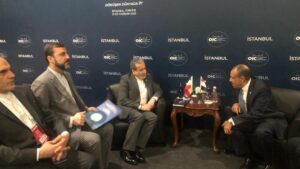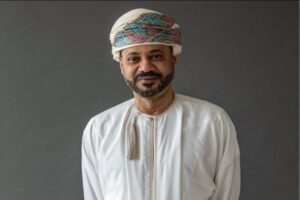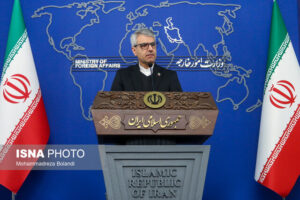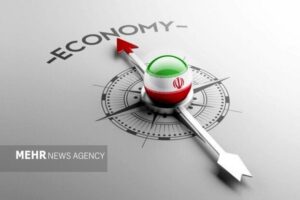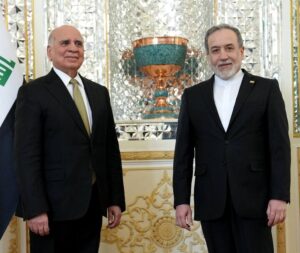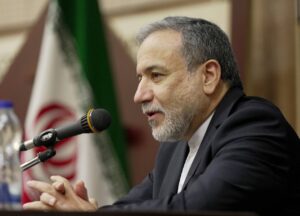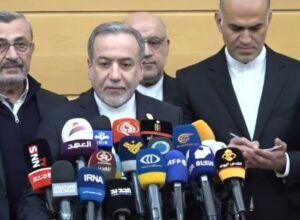Araghchi: For diplomacy to resume, the aggression must stop
Iran’s Foreign Minister, Abbas Araghchi, attending the Organization of Islamic Cooperation (OIC) summit in Istanbul, told reporters:
“What we are doing right now is the exercise of our legitimate right to self-defense against an unprovoked and brutal act of aggression.”
Araghchi emphasized that diplomacy can be effective—it has worked in the past and can work in the future. “But for us to return to diplomacy, the aggression must stop,” he stressed.
He further stated that it is obvious Iran cannot enter negotiations with the United States while its people are under bombardment backed by Washington.
“We have unfortunately concluded that the United States has been involved in the aggression from the beginning,” he said.
“They deny it and keep insisting they are not involved, but we have many indications suggesting otherwise. Sadly, we’ve heard the U.S. may even join the aggression directly. That would be very unfortunate—and I believe, very dangerous for everyone,” he concluded.
The ministers are in the Turkish metropolis for the 51st session of the Organization of Islamic Cooperation (OIC) Council of Foreign Ministers, scheduled for June 21 – 22.
Araghchi meets counterparts on sidelines of OIC summit
The summit is focused on the issue of Israel in the region, particularly the recent unprovoked attack by the Zionist regime on Iran.
On the sidelines of the summit, Araghchi held meetings with his counterparts from Jordan, Qatar, Saudi Arabia, and Iraq.
Qatar strongly condemns Israeli aggression
The Qatari Ministry of Foreign Affairs strongly condemned the Zionist regime’s aggression against Iran’s sovereignty and territorial integrity. On behalf of the Emir of Qatar, the foreign minister expressed condolences for the martyrdom of Iranian military personnel and civilians.
The Qatari Foreign Minister also voiced deep concern over the escalation of tensions and stressed the need for continued consultations and enhanced cooperation among regional countries to stop the Zionist regime’s crimes.
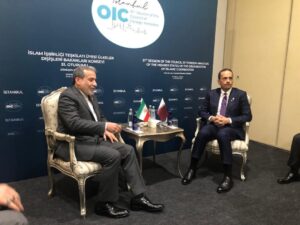
Meeting with Iraq’s Foreign Minister
Araghchi also met with Iraq’s Foreign Minister, Fuad Hussein, who reaffirmed the stance of the Iraqi government, people, various political factions, and religious leaders in strongly condemning the Zionist regime’s assault on Iran, which resulted in the martyrdom of dozens of civilians and military figures.
Fuad Hussein stressed that Islamic countries must continuously and collectively work to condemn the Zionist regime’s violations at the international level.
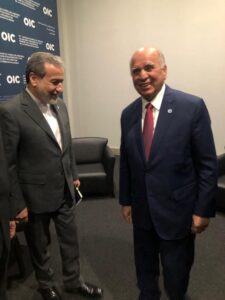
Saudi Arabia: Yemen’s stance in targeting U.S. Navy ships in the Red Sea is appreciated
Saudi Arabia’s Minister of Foreign Affairs, Faisal bin Farhan Al Saud, condemned Israel’s act of aggression against Iran, on the sidelines of Organization of Islamic Countries (OIC) Summit in Turkey.
He stated that Israel’s actions violate Iran’s sovereignty and security, constituting a clear breach of international law.
He added, “We appreciate Yemen’s brave stance in targeting American Navy ships and forces in the Red Sea, should the U.S. initiate a military conflict against Iran in support of Israel,” wrote Isna Persian section.
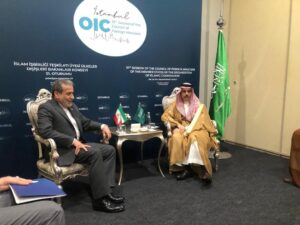
Meeting with Jordan’s Foreign Minister
Araghchi also held talks with Jordan’s Foreign Minister on the sidelines of the OIC summit. The Jordanian minister condemned Israel’s act of aggression and provocation, describing it as a breach of international law. Both sides agreed on the urgent need for diplomatic contacts to help reduce regional tensions.
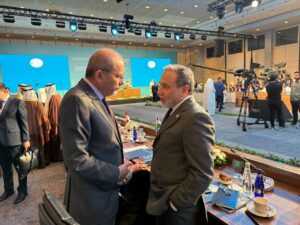
Erdoğan : “I am optimistic that victory will be Iran’s”
Turkish President Recep Tayyip Erdoğan has said he’s “optimistic that victory will be Iran’s” in a blistering speech at a gathering of Organization of Islamic Cooperation (OIC) foreign ministers in Istanbul.
Turkish President Tayyip Erdogan said on Saturday that Israel’s attacks on Iran right before a new round of nuclear talks with the United States aimed to sabotage the negotiations, and it showed Israel did not want to resolve issues through diplomacy.
Speaking at a foreign ministers’ meeting of the Organization of Islamic Cooperation in Istanbul, Erdogan urged countries with influence over Israel not to listen to its “poison” and to seek a solution to the fighting via dialogue without allowing a wider conflict.
Iran’s Foreign Minister appreciated the expression of solidarity and the firm stance of the Turkish government and its people in condemning the Zionist regime of Israel for violating Iran’s sovereignty and territorial integrity. He also praised Turkey’s emphasis on unity and cohesion among Islamic countries in the face of Israel’s aggression.
Araghchi elaborated on the Zionist regime’s attacks on public infrastructure, nuclear facilities, residential areas, hospitals, care centers, and the Islamic Republic of Iran Broadcasting (IRIB). He also recalled the martyrdom of several senior military officials, academics, and innocent civilians, particularly women and children, due to the barbaric attacks by the Zionist regime.
He stated, “The warmongering and expansionist nature of the Zionist regime is the root cause of insecurity in the region. The international community must clearly condemn Israel’s violations against Iran and compel the United Nations Security Council to fulfill its responsibility in halting Israeli assaults and holding the regime accountable.” He stressed that major and influential Islamic countries play a vital role in applying pressure on the Zionist regime and its supporters.
President Erdogan said he had repeatedly reached out to Israel, calling for an immediate cessation of hostilities and a return to diplomacy. He emphasized that Iran’s nuclear issue can only be resolved through diplomatic channels.
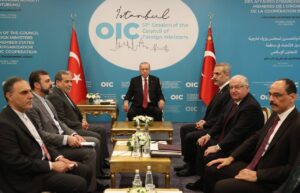
Meeting with Egypt’s Foreign Minister
In his meeting with Egypt’s Foreign Minister, Badr Abdellaty, the latter reiterated his government’s firm condemnation of Israel’s violations against Iran. He emphasized that the attack was a blatant infringement of Iran’s sovereignty and a clear breach of the United Nations Charter. He warned that such violations could dangerously escalate tensions in the region and lead to unpredictable consequences.
